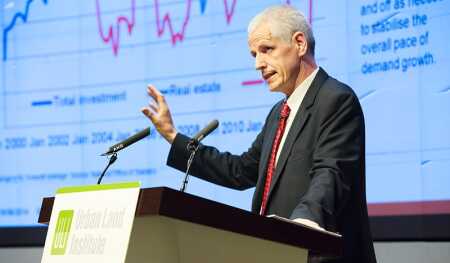The systemic euro crisis is “history,” Berenberg Bank chief economist Holger Schmieding proclaimed last month in his keynote address at ULI’s Real Estate Trends Conference in London.
“Fear of breakup has gone and economic sentiment is now above the long-term average,” said Schmieding, who was named Forecaster of the Year by the Financial Times Deutschland in 2011 for his predictions regarding escalation of the euro crisis. “Spending is not quite back to average yet, but after shocks, it takes a while. If no new accident happens, spending patterns will gradually normalize as trust returns.”
Schmieding said that with low inflation boosting real incomes, unemployment falling, and gross domestic product (GDP) rebounding in all crisis countries except Cyprus, the largest threat to Europe’s economic outlook is the conflict between Russia and Ukraine.
But, he added, “Russia had much more to lose economically than the West” if open war erupted. An external threat could even strengthen internal cohesion of the Eurozone and elicit a further European Central Bank response, probably in the form of quantitative easing, he argued.
The U.S. financial crisis exposed unstable financial policies and large debt exposure in the European region during 2008, and Europe’s crisis began when Greece’s new government revealed its budget deficit would be double that of the previous government.
In the aftermath, ten European economies slipped into recession, with Spain, Italy, Ireland, Portugal, and Greece the hardest hit. The risk of further turmoil deterred international investors: the European commercial real estate market attracted just 4 percent of the capital invested by overseas investors during the first half of 2009.
“Crises of such magnitude are pretty rare events,” Schmieding said of the collapse of Lehman Brothers in 2008. “Post-Lehman, the Western world saw the worst drop in GDP in 80 years.”
His optimism regarding the outlook for Europe is at odds with the comments of German Chancellor Angela Merkel, who said last month that the European Central Bank’s decision to lower deposit rates for banks to –0.1 percent and interest rates to 0.15 from 0.25 percent showed the crisis had not been entirely overcome.
But confidence in the region’s real estate market is in line with Schmieding’s outlook. Real estate services firm CBRE reported in February that activity had rebounded in peripheral markets such as Spain, Italy, Ireland, and Portugal, with €11.8 billion (US$16.1 billion) of investment volumes in 2013, representing a doubling of investment during 2012. It predicted Madrid could rank among the top European investment destinations this year.
Schmieding said Spain, Ireland, Portugal, and Greece were over the worst, having “largely solved” the problems they needed to in order to return to modest economic growth. This presents opportunities for investors going forward, he said.
“Spain is a good economy. You could have invested there safely in the last two years,” he said. “While the best gains are over, there are still a lot to come. Falling unemployment will progressively improve.”
However, he noted that interest rate increases can be expected over the coming months for the United Kingdom, the Eurozone, and the United States. “The U.K. will see its first rate rise in November,” he predicted. “The U.S. will see its first interest rate rise in April, and in the Eurozone, which has very low inflation, it will probably be the end of next year before we see the first modest hike.”
Prime Market Pricing Rings Alarm Bells
Mark Carney, governor of the Bank of England, said in June that the first U.K. interest rate hike following the financial crisis was imminent—a move that likely will create “a cooling-off period in the core real estate market,” Paul Clark, partner of global research consultancy Property Market Analysis, said at the conference.
Clark spelled out his concerns regarding pricing in London and other core European markets such as Germany and France, predicting they would “get more expensive and then suffer a correction” should bond yields rise in these markets. “This will lead to a sharp slowdown in property returns between 2016 and 2018,” he predicted.
“Our biggest concern is pricing in core real estate. We are heading towards 2007 values,” he said. “Nothing ruins a good asset class like getting itself overpriced, and that’s where we’re heading.”
Prime yields in central London’s office market this May were between 4.75 percent for City offices and 3.5 to 3.75 percent for West End offices, according to Property Market Analysis research.
“Data from City of London over the last 60 years shows that if you buy at sub–5 percent yields, then your returns over a five- to ten-year hold period are zero,” Clark said.
Clark also expressed concern regarding the possibility of rising bond yields combined with rising interest rates and a tapering of quantitative easing, arguing that it could reduce the appetite of investors for distressed loan portfolios.
“While the U.S. and U.K. banks have fought through their bad loan books, banks on the continent are just getting started on theirs,” he said. “There will be plenty of sales coming through between now and 2016, but demand could dry up somewhere [in that economic environment].”
He said strong flows of overseas capital into the United Kingdom, driven by commodity pricing, are a potential weakness in the future, with those international investors being driven to property markets in Spain or the regional U.K. cities and away from London’s “aggressively priced” market.
Risk-adverse institutional investors should look to markets such as the Netherlands for a more moderately priced core European market, while “emerging pitches” in core European cities and food-anchored retail could offer better risk-adjusted returns, he said.





